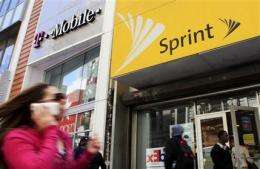Cheaper service helps Sprint cut subscriber loss

(AP) -- Sprint Nextel Corp. got more customers to stick around in the first quarter but did so by offering cheaper service, and posted a larger loss than a year earlier.
The nation's third-largest wireless carrier said Wednesday that it lost a net 75,000 subscribers in the first three months of 2010, compared to a decline of 182,000 in the same quarter last year.
Its quarterly loss amounted to $865 million, or 29 cents per share, versus a loss of $594 million, or 21 cents per share, a year earlier.
Excluding a tax charge of $365 million, the loss would have been 17 cents per share, matching the average estimate of analysts surveyed by Thomson Reuters.
Revenue for the Overland Park, Kan., company slipped 2 percent to $8.09 billion from $8.21 billion. Analysts expected $8.05 billion in revenue.
Its shares rose 19 cents, or 4.7 percent, to $4.28 in morning trading.
Sprint is reducing its subscriber losses by offering relatively cheap "prepaid" plans, which don't require contracts. It does so mainly under the Boost Mobile and Virgin Mobile brands. It now has 11 million prepaying subscribers and 33.4 million who sign contracts, so-called "postpaid" subscribers. Counting subscribers through resellers and affiliates, Sprint's total is 48.1 million.
The focus on prepaid serves Sprint well, because overall growth in "postpaid" subscribers is slowing precipitously across the industry. Nearly everyone who has credit good enough for a contract already has a phone. That was evident in AT&T Inc.'s and Verizon Wireless' figures for the first quarter. Last week, both reported the lowest net number of new contract-signing customers in many years.
Sprint lost a net 578,000 contract-signing customers, an improvement from a loss of 1.25 million in the same quarter last year. CEO Dan Hesse noted on a conference call with financial analysts that of the three largest carriers, Sprint was the only one to show an improving trend this quarter.
Analyst Craig Moffett at Sanford Bernstein said Sprint is "doing the right things." But it's doing so just as the growth of contract-signing subscribers is slowing across the industry, and the improvements may not be enough to keep Sprint's numbers steady.
"We have often used the analogy of learning to swim just as the water is being drained from the pool, and never has that phrase seemed more apt," he wrote in a research report.
By selling prepaid service, Sprint is tapping into a different pool - people who can't afford pricier plans. But competition is fierce in this space as well. AT&T and Verizon Wireless don't deign to compete here under their own brands, but they resell access to their networks to smaller operators like Tracfone LLC. In addition, regional carriers MetroPCS Communications Inc. and Leap Wireless International Inc. have been cutting prices.
Sprint's prepaid customers paid an average of $27 per month in the first quarter, down from $31 per month in the fourth quarter. Contract-signing customers paid an average of $55 per month in the first quarter.
Sprint added a net 348,000 prepaying customers, down from 674,000 added in the same quarter last year, when Sprint's $50-per-month plan for unlimited calling was fresh.
As before, it was the Nextel part of the business, acquired in 2005, that accounted for most of the subscriber flight in the quarter. The Nextel network offers a popular walkie-talkie-like function popular for on-the-job communications by construction crews and other blue-collar workers, but it doesn't support smart phones well. As the professional crowd has bailed on Nextel, Sprint has repositioned it as a network for cheap prepaid service. However, even that initiative seemed to falter in the first quarter, as the company lost 44,000 prepaid customers on the Nextel network. Instead, most of the prepaid additions were on the Sprint network.
Hesse said Sprint hasn't made any decisions about the future of the Nextel network, but is looking at taking some of the wireless spectrum used by Nextel phones and using it for Sprint phones instead.
Looking ahead, Sprint's big hope is "4G," or the next generation of cellular broadband service. Sprint plans to sell its first 4G phone this summer, with a large touch screen and two cameras for video conferencing. The phone will use the network of Clearwire Corp., of which Sprint owns a slim majority. The other investors include cable TV companies, Intel Corp. and Google Inc.
Clearwire is ahead of AT&T and Verizon Wireless in offering 4G speeds, but Verizon plans to fire up its network late this year. AT&T is focusing on boosting speeds on its existing network.
©2010 The Associated Press. All rights reserved. This material may not be published, broadcast, rewritten or redistributed.

















